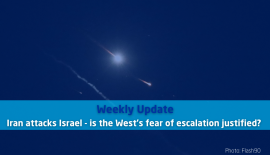Israel & Christians Today: Weekly Update (February 15)
As the world looks desperately for peace, the G-d of Israel is preparing to send His Son as Messiah. He will reign from Jerusalem, in the midst of the Jewish people – then, but only then, true peace will come on earth.
Christians are called to be “peace-makers” (Matthew 5:9). But that does not mean trying to create peace on earth by our own means. It means looking towards the Prince of Peace, and praying and preparing for His coming. Of course in the meantime we must do all that makes for peace.
“Now, brothers and sisters, about the times and dates we do not need to write to you, for you know very well that the day of the Lord will come like a thief in the night. While people are saying, ‘Peace and safety’, destruction will come on them suddenly, as labor pains on a pregnant woman, and they will not escape” (1 Thessalonians 5: 1-3)
Maranatha! Come Lord Jesus!
In this week’s round-up of current affairs:
- Trump’s peace plan remains a secret until April
- Arabs agree – Iran’s the main threat to peace
- Netanyahu and Visegrad
- Palestinian journalism Hamas style
Trump’s Peace plan to be announced in April
US President Donald Trump’s senior Middle East adviser, son-in-law Jared Kushner, said Thursday that the Trump administration would unveil its much-awaited Middle East “Deal of the Century” after the Israeli elections on April 9.
Read article
Arab leaders agree at Warsaw Mideast Summit – Iran is the main obstacle to peace
Times of Israel reports that at a closed opening session of the conference several Arab leaders spoke out clearly against the threat that Iran poses to peace in the region. Foreign minister of the United Arab Emirates Sheikh Abdullah bin Zayed Al Nahyan indicated that Israel was justified in attacking Iranian targets in Syria. “Every nation has the right to defend itself, when it’s challenged by another nation, yes,” he answered in response to a question by the panel’s moderator, former US Middle East peace negotiator Dennis Ross, about Israeli strikes intended to prevent Iran from entrenching itself militarily in Syria.
Bahraini Foreign Minister Khalid bin Ahmed Al Khalifa said that the peace process between Israelis and Palestinians would have been at a much better place if not for Iran’s malign behavior. “We grew up talking about the Israel-Palestine issue as the most important issue” that has to be “solved, one way or another.” he said. “But then, at a later stage, we saw a bigger challenge, we saw a more toxic one — in fact the more toxic one in our history — that came from the Islamic Republic. If it wasn’t for Iran’s regional aggression, we would have been much closer today in solving this issue with Israel,” Khalifa continued on, with Netanyahu, and other delegates from 60 countries looking on. “But this is a serious challenge that is preventing us now from moving forward anywhere, be it Syria, be it Yemen, be it Iraq, be it anywhere,” the Bahraini foreign minister said.
Read more
Netanyahu and the sensitivities of European politics
Israel’s PM Benyamin Netanyahu is scheduled to host the leaders of the four Visegrad countries (Poland, Hungary, Czech and Slovak Republics) in Israel on February 18-19. According to Times of Israel this historic summit is part of the PM’s efforts to strengthen ties with central European nations in a bid to “build up a bloc of support within the EU. The Jerusalem meeting would be the first time the consortium, which was founded in 1991, ever convened outside of Europe”. The meeting “will likely touch on ways the four countries can help fight what Netanyahu considers the European Union’s unfair policies toward Israel.”
Poland was outraged this week when Netanyahu was reported in Jerusalem Post to have said in Warsaw that “the Polish nation” collaborated with the Nazi’s in WWII. Poland adopted a law last year making it illegal to charge Poles with collaboration. Polish President Andrzej Duda threatened to pull out of the Jerusalem summit. It appears Netanyahu was misquoted, the JP retracted the article and the matter seems to have blown over. But it shows the delicate political sensitivities that the PM faces in trying to build political ties with nations that have a not-always-untainted past (or present) in stimulating anti-Semitism.
Read more
Palestinians: Journalism Hamas style
Israeli Palestinian journalist Khaled Abu Toameh reports in the Gatestone Institute on the way Hamas restricts the freedom of journalists who criticise Hamas.
“By controlling the media, Hamas has been able to send a message to the world that the misery of the Palestinians in the Gaza Strip can be laid squarely at the feel of Israel and President Mahmoud Abbas’s Palestinian Authority (PA). A few foreign journalists who briefly visited the Gaza Strip and filed reports that Hamas did not like have been quietly told that they are no longer welcome to return to the Hamas-ruled coastal enclave. Palestinian journalists who nevertheless challenged Hamas by reporting on sensitive issues, such as financial and administrative corruption in the Gaza Strip, are still suffering from the long arm of Hamas.”
Read more
Andrew Tucker is International Editor of our bi-monthly newspaper Israel & Christians Today. The goal of Israel & Christians Today is to help Christians to take God’s Word seriously, and study current events in the world in the context of the Bible. Click here to subscribe.





